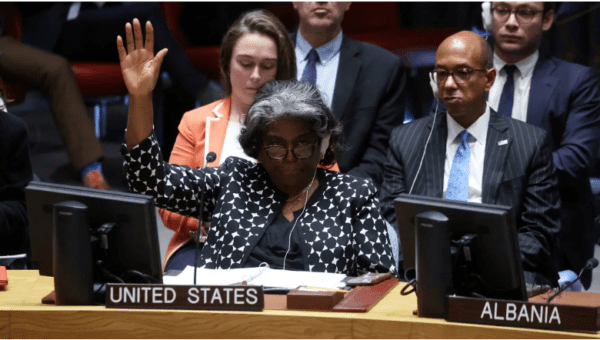In recent months, as fighting rages on in Gaza between Hamas-led militants and the Israeli Defense Forces (IDF), focus has shifted in part to the legal, political, and humanitarian ramifications of the conflict – and with a reported 30,000+ casualties in the strip, many have demanded immediate action to put a stop to the hostilities.
The United Nations Security Council (UNSC), the United Nations’ (UN) main organ concerned with maintaining international peace and security, has repeatedly attempted to pass resolutions to stem the violence, yet has run into a number of issues along the way. The primary roadblock has come in the form of the veto power, possessed by the 5 permanent (P5) members of the Council – China, France, Russia, the United Kingdom, and the United States – that allows the global powerhouses to stop resolutions from being passed. In the past months, it has been the United States exercising its right of denial, vetoing a resolution that called for an immediate ceasefire, the third time that Washington has done so since October. The move was defended by the U.S Ambassador to the United Nations, Linda Thomas-Greenfield, who argued that, “Any action the council takes right now should help not hinder these sensitive and ongoing (hostage release) negotiations,” and that “Demanding an immediate unconditional cease-fire without an agreement requiring Hamas to release the hostages will not bring endurable peace.” Criticism inevitably followed from international aid organizations, with the Executive Director of Doctors Without Borders in the United States, Avril Benoit, saying that, “the United States at the U.N. Security Council is effectively sabotaging all efforts to bring assistance.” The U.S., for its part, drafted an opposing resolution, calling for a “temporary ceasefire in Gaza as soon as practicable” but no solution has been achieved within the Council thus far.

Meanwhile, across the pond, controversy has continued to surround the UK Government’s response to the conflict and the various resulting crises. In November, the opposition Labour Party faced a mini-rebellion over their ceasefire stance, a sentiment which has been growing ever since. Near the end of last month, following a full day of debate within the House of Commons, the Labour Party’s non-binding resolution calling for an “immediate humanitarian cease-fire” was passed, but only following a walkout from members of both the governing Conservative Party and the opposition Scottish National Party (SNP). The SNP, using their ‘opposition day’ – “allocated in the House of Commons for the discussion of subjects chosen by (an) opposition (party)” – to set the agenda, had proposed their own resolution demanding an immediate ceasefire, the release of all Hamas-held Israeli hostages, as well as, crucially, “an end to the collective punishment of the Palestinian people.” Before the motion was voted on, however, the Speaker of the House of Commons, Lindsay Hoyle, controversially allowed the Labour Party to step in in order to propose their own amendment which, while also insisting on a cease-fire in the region, included “softer language on Israel’s conduct in the war.” Hoyle’s intervention, widely regarded as unprecedented, as it denied the SNP the chance to vote for their own motion on their own ‘opposition day,’ was heavily scrutinized by both the SNP and the Conservative Party, with members of both parties walking out of the House of Commons in protest. Hoyle, who apologized for his actions the next day – saying “I have tried to do what I thought was the right thing for all sides of the House” – faced calls to resign, as well as over 80 no-confidence votes, but has remained in his post.

The following week, on 29 February, a reported total of at least 118 Palestinians were killed after Israeli forces fired at a large crowd surrounding a convoy of humanitarian aid trucks, with over 750 injured as a direct result of the attack, as well as in the stampede that followed. The actions were defended by Daniel Hagari, head of the Israeli Defense Force’s (IDF) spokesperson unit, who said, “We didn’t open fire on those seeking aid. Contrary to the accusations, we didn’t open fire on a humanitarian aid convoy, not from the air and not from land. We secured it so it could reach northern Gaza.” U.S officials publicly stressed the effects the situation would have on the ongoing negotiation process, with a State Department Spokesman saying, “We are urgently seeking additional information on exactly what took place.” The attack was not the first of its kind, with a United Nations report concluding that similar events took place on 5 February, when “a food convoy waiting to move into Northern Gaza was hit by Israeli naval gunfire,” although that strike did not result in any casualties. On Thursday, 14 March, a reported “20 people were killed and 155 wounded” by alleged Israeli shelling whilst waiting at a food aid point, although a preliminary review from the IDF found that their forces “did not open fire at the aid convoy in Kuwait Square” arguing on the contrary that “armed Palestinians opened fire while Gazan civilians were awaiting the arrival of the aid convoy.”

Meanwhile, the United States outlined plans to establish a maritime aid corridor into Gaza, with President Biden announcing in his State of the Union Address his orders for the U.S. military to “lead an emergency mission to establish a temporary pier in the Mediterranean on the Gaza coast that can receive large ships carrying food, water, medicine, and temporary shelters,” which would “enable a massive increase in the amount of humanitarian assistance getting into Gaza every day.” Ongoing aid programs have largely been criticized, both in their planning and execution – at least 5 were killed and 10 injured when airdropped aid shipments fell on residential areas in the Al Shati Refugee Camp. Aid to Gaza from the U.S. has been welcomed by Israel, and there is near-unanimous hope that more developments will continue to be made in the near future. Overall, while the conflict itself seems to have little chance of ending anytime soon, there seems to be a widespread consensus that the short-term steps are clear: a deal between Israel and Hamas to release all hostages, a humanitarian ceasefire within the region, and an increase of humanitarian aid to those who need it the most.
Cover Image: The UN Security Council meets at the UN Headquarters in New York City.







